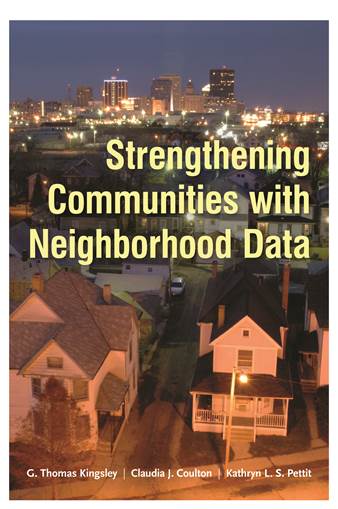 Watch the webcast of the live launch event.
Watch the webcast of the live launch event.
Efforts to address the problems of distressed urban neighborhoods stretch back to the 1800s, but until relatively recently, data played little role in forming policy. It wasn’t until the early 1990s that all the factors necessary for rigorous, multifaceted analysis of neighborhood conditions—automated government records, geospatial information systems, and local organizations that could leverage both—converged. Strengthening Communities documents that convergence and details its progress, plotting the ways data are improving local governance in America.
Get a copy of Strengthening Communities with Neighborhood Data
- Download the free e-book
(Epub format optimized for Adobe Digital Editions reader, but readable with iBooks or other epub readers.) - Download the PDF
- Authors and Essayists
- National Neighborhood Indicators Partnership
Praise for Strengthening Communities
The sea change we have seen in the collection and use of neighborhood data represents a true advance in our ability to conduct evidence-based policymaking. This engaging book tells the story of this revolution and offers a vital roadmap for those seeking to contribute to lasting improvement in America’s communities. It is a must read for anyone aspiring to be a positive change agent at the neighborhood level, especially in neighborhoods that are home to low-income and minority families.
– Raphael W. Bostic, Bedrosian Center director, University of Southern California Price School of Public Policy and former Assistant Secretary of Policy Development Research, US Department of Housing and Urban Development
For organizers, advocates, civic leaders, local government officials, and policy researchers who want to understand how data can advance community change, this book is a huge gift. With an eye on future challenges, the authors lay the groundwork for animating democracy by demonstrating how effective use of data can deepen participation. This book could have been called “Data Rock!”
– Angela Glover Blackwell, founder and CEO, PolicyLink
The 21st century has brought vast amounts of new data on conditions and trends in urban communities. We are only beginning to grasp the value and power of this information. This book should be required reading for researchers who want to harness new sources of data to gain a deeper understanding of how and why neighborhoods change. It is also a useful roadmap for community leaders and public officials who want to use data to identify emerging challenges in low-income neighborhoods and craft effective policies to address them.
– Ingrid Gould Ellen, director of the Urban Planning Program at the New York University Robert F. Wagner Graduate School of Public Service and faculty director of the Furman Center for Real Estate and Urban Policy
Data are among the most powerful tools available in a democracy. Armed with data, communities can cut through ideological boundaries, focus on things that matter, and engage in conversations about challenges and opportunities. Anyone interested in helping a community make good decisions should read this book to understand the use of neighborhood data and the community information field.
– Paul S. Grogan, president and CEO, The Boston Foundation
Strengthening Communities with Neighborhood Data was written with generous support from the John D. and Catherine T. MacArthur Foundation.